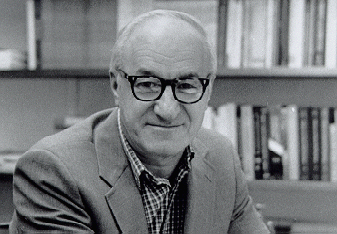
|
Albert Bandura
"Perceptions are guided by preconceptions. Observers' cognitive competencies
and perceptual sets dispose them to look for some things but not others.
Their expectations not only channel what they look for but partly affect
what features they extract from observations and how they interpret what
they see and hear." ~ Albert Bandura, 1986, p. 53.
|
Albert Bandura believed that aggression
is learned through a process called behavior modeling. He believed that
individuals do not actually inherit violent tendencies, but they modeled
them after three principles (Bandura, 1976: p.204). Albert Bandura argued
that individuals, especially children learn aggressive reponses from observing
others, either personally or through the media and environment. He stated
that many individuals believed that aggression will produce reinforcements.
These reinforcements can formulate into reduction of tension, gaining financial
rewards, or gaining the praise of others, or building self-esteem
By the mid-1980s Bandura had developed
a social cognitive theory of human functioning. In this view, people
are self-organizing, proactive, self-reflecting and self-regulating, not
just reactive organisms shaped and shepherded by environmental forces or
driven by concealed inner impulses. Human functioning is the product of
a dynamic interplay of personal, behavioral, and environmental influences.
In this model of triadic reciprocal causation, people are producers as
well as products of their environment.
A further distinctive feature of
social cognitive theory that Bandura singles out for special attention
is the capacity for self-directedness and forethought. People plan
courses of action, anticipate their likely consequences, and set goals
and challenges for themselves to motivate, guide and regulate their activities.
After adopting personal standards, people regulate their own motivation
and behavior by the positive and negative consequences they produce
for themselves. They do things that give them satisfaction and a sense
of self-worth, and refrain from actions that evoke self-devaluative reactionslarge
body of knowledge bearing on this theory.
Self-efficacy is the belief in one's
capabilities to organize and execute the sources of action required to
manage perspective situations.
source: http://www.des.emory.edu/mfp/bandurabio.html
